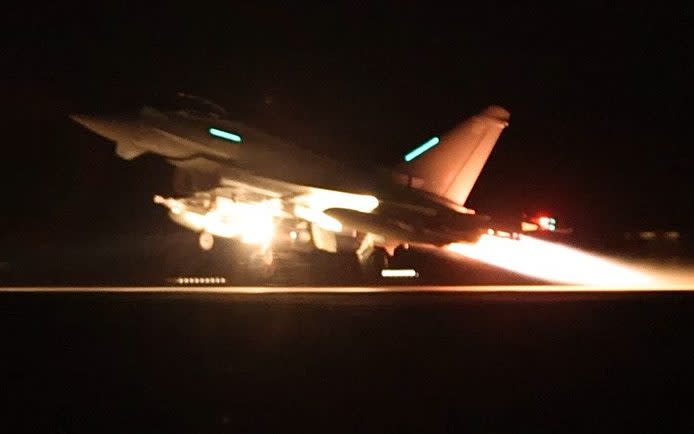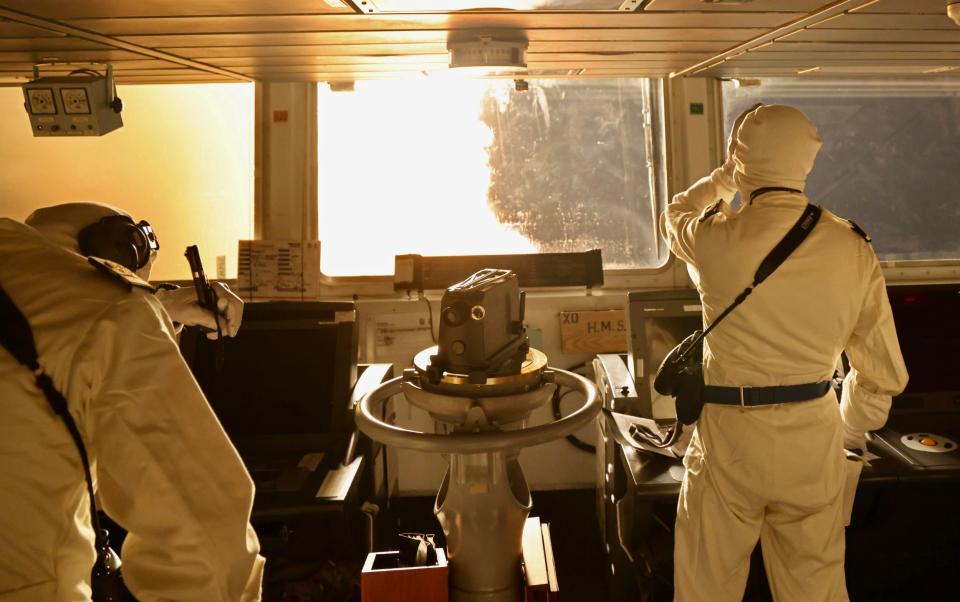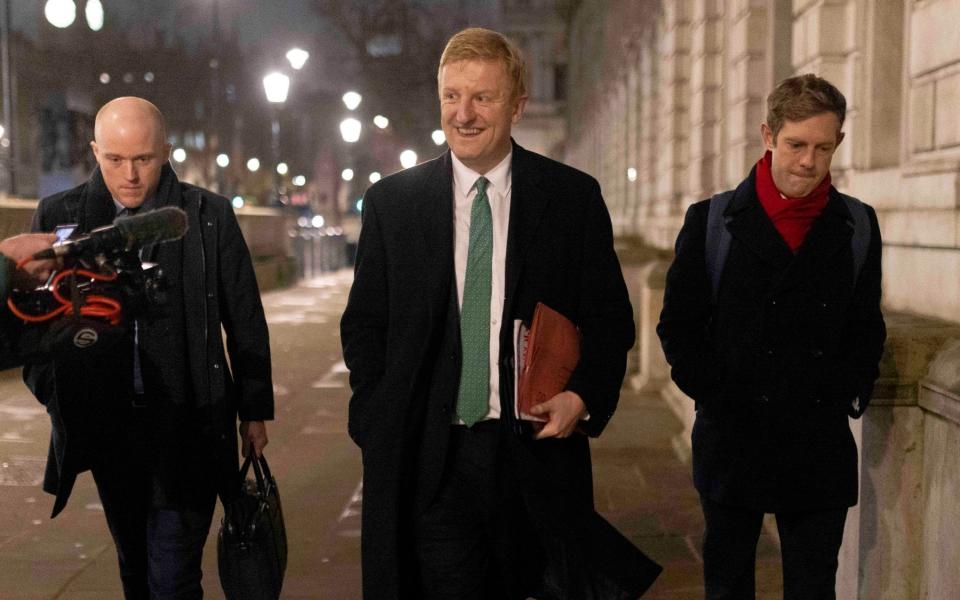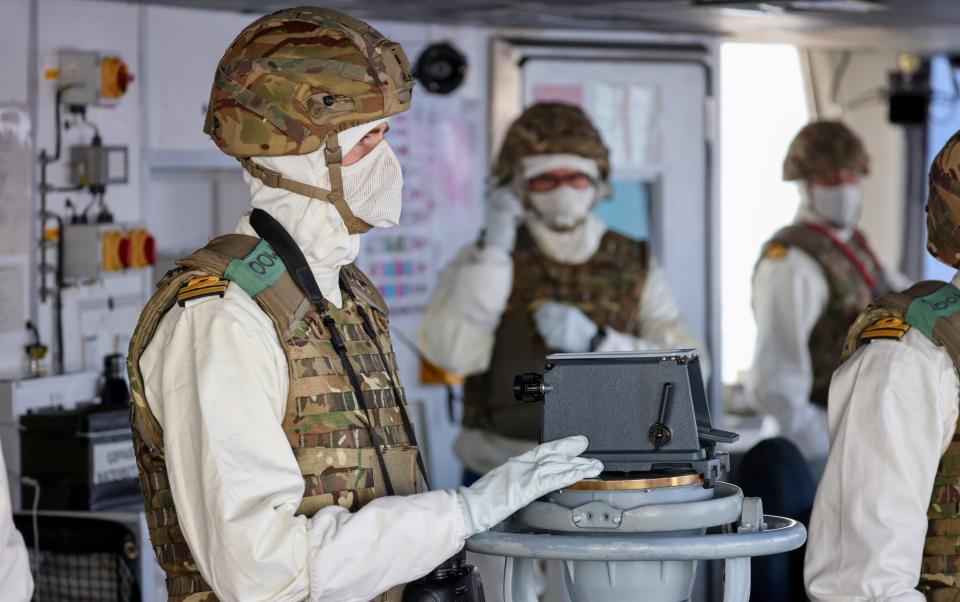West is united against Houthi threat, says Biden as Britain and US launch air strikes in Yemen

- Oops!Something went wrong.Please try again later.
The West is united against Houthi aggression in the Red Sea, President Joe Biden said on Thursday night as Britain and the US launched air attacks against Iran-backed rebels in Yemen.
The strikes – undertaken to protect shipping routes in the region – began just after 11pm UK time on Thursday and hit more than 60 targets in 16 locations, ranging from training bases to drone storage sites.
At least three explosions were heard in Sanaa, the capital of Yemen, according to witnesses.
Confirming the involvement of the Royal Air Force and Royal Navy, Rishi Sunak said the ‘‘limited, necessary and proportionate’’ operation was ‘‘in self-defence’’ against the ‘‘reckless actions’’ of Houthi rebels.
“Despite the repeated warnings from the international community, the Houthis have continued to carry out attacks in the Red Sea, including against UK and US warships just this week,’’ the Prime Minister said.
“This cannot stand. The United Kingdom will always stand up for freedom of navigation and the free flow of trade.’’
Four RAF Typhoons used Paveway IV guided bombs in ‘‘precision strikes” that had been chosen to “reduce the Houthis’ capability to violate international law”, according to the Ministry of Defence.
One of the targets of British warplanes was an airfield US and UK spies believed to be a launch site for cruise missiles and drones that have threatened vessels in the Red Sea.
Mr Biden said that the strikes are a “clear message” to Houthi rebels and that he “will not hesitate” to strike the group again if necessary.

The US president said that the West had been “united and resolute” in response to the attacks, including with an “extensive diplomatic campaign” of warnings to Houthis before the strikes took place.
Washington confirmed Australia, the Netherlands, Canada and Bahrain had provided ‘‘non-operational’’ support and the governments of those four countries later joined the US, UK, Denmark, Germany, New Zealand and the Republic of Korea in issuing a statement justifying the strikes against Houthi targets.
Iran and Hezbollah condemned the attack, while a Houthi spokesperson said the strikes were not justified and the group would continue targeting ships heading towards its enemy, Israel.
Russia said on Friday morning it had requested an urgent meeting of the UN Security Council to discuss the strikes.
It followed a day of frenetic behind-the-scenes activity in Whitehall on Thursday, including an emergency Cobra meeting of senior ministers and a gathering of the National Security Council.
On Thursday, Mr Sunak told Abdel Fattah el-Sisi, the Egyptian president, that the “UK would continue to take action to defend freedom of navigation and protect lives at sea”.
A Downing Street spokesman said: “They discussed the concerning rise in Houthi attacks on commercial vessels in the Red Sea and the disruptive impact on global shipping, including through the Suez Canal.”
Lord Cameron, the Foreign Secretary, went to Downing Street at 8pm on Thursday to brief ministers on the call.
Sir Keir Starmer, the Labour leader, John Healey, the shadow defence secretary, and Sir Lindsay Hoyle, the Commons Speaker, were also briefed on the situation, indicating that there would be no time for a parliamentary vote to approve military action.
John Kirby, the White House’s national security spokesman, said: “We are going to do what we have to do to counter and defeat these threats that the Houthis keep throwing up on commercial shipping in the Red Sea.
“We will continue to consult with allies and partners about the appropriate next steps.”

Grant Shapps, the Defence Secretary, hinted earlier this week that action was coming, urging Houthi rebels to “watch this space” as he warned that Iran was “guiding what is happening there in the Red Sea”.
Lord Cameron last month warned that Britain would not tolerate the escalation of Tehran’s “malign” activities, either in the Middle East or on home soil.
The Houthis’ leadership, which has the support of Iran, claims the attacks are aimed at pressuring Israel to halt its bombing campaign in the Gaza Strip, where thousands of Palestinians have been killed.
Abdul-Malik al-Houthi, a senior Houthi official, warned on Thursday that any Western strikes would be met with more aggressive attacks.
“The retaliation to any American strike will not only be at the level of the current operation, which included more than 24 drones and multiple missiles, but will be larger,” he said.
Abdulsalam Jahaf, a member of the group’s security council, said the Houthis would “burn [US] battleships and all its bases and everyone who cooperates with it, no matter what the cost.
“Do the Americans, the British, and the Zionists expect that any hostile action against Yemen will distract us from defending Gaza?” he wrote on social media.
The UK is part of a joint taskforce coordinated by the US, codenamed Operation Prosperity Guardian, that – with France – has been operating in the Red Sea since last month.
Warships have shot down Houthi attack drones attempting to disrupt commercial shipping in the Bab-el-Mandeb Strait, which carries 10 per cent of global shipping traffic.
Maritime executives in the Middle East were warned on Thursday to expect strikes by a US-led coalition in the region, the Wall Street Journal reported, while Houthi rebels had reportedly begun moving their weapon stockpiles in anticipation.
The targets were thought to include drone launch sites, radar stations and weapons depots near the Yemeni cities of Hodeida and Hajjah, and infrastructure in Sanaa.
The strikes on Thursday came after the Houthis mounted their largest and most complex assault in the Red Sea to date. Out of 21 missiles and drones fired by the rebels, Britain’s HMS Diamond, a Type 45 destroyer, shot down seven.

Some of the missiles were aimed at US-flagged merchantmen crossing the Red Sea area, while others targeted American, British and international warships protecting the merchant traffic.
Mr Shapps described it as “the largest attack on a Royal Navy warship in decades” and said he believed the Houthis, a Shia group that has held Yemen’s capital since 2014, had been acting with the support of Iran.
In the wake of the attack, the UN Security Council passed a resolution demanding an immediate end to the Houthi attacks, and endorsed the right of UN member states to defend their vessels.
The resolution demanded “that the Houthis immediately cease all such attacks, which impede global commerce and undermine navigational rights and freedoms as well as regional peace and security”. Eleven nations voted for it, but Russia, China, Mozambique and Algeria abstained.
For the last decade the Houthis have waged a bitter civil war against a Saudi-led coalition in Yemen. They are thought to have been provided with intelligence from an Iranian surveillance ship called the Behshad.
Houthi missiles have been stockpiled in bunkers in densely populated areas controlled by the rebel group, which has been in conflict with the former Yemeni regime since 2014.
Mohammed al-Bukhaiti, a senior Houthi official, previously vowed that the attacks would only stop if Israel’s “crimes in Gaza stop and food, medicines and fuel are allowed to reach its besieged population”.
There has been global concern about disruption in the key shipping route, which carries 40 per cent of Europe’s trade with Asia and the Middle East.
Some major shipping lines and oil giant BP have already diverted vessels around southern Africa – adding time and costs to journeys – rather than risk the Red Sea.
In a statement on Thursday night, the US military’s central command, which covers the Middle East, said Houthis fired an anti-ship ballistic missile from Yemen into international shipping lanes at 2am local time.
The statement said a commercial ship had seen the missile hit the water, with “no injuries or damage reported”. It was the 27th attack since Nov 19.

